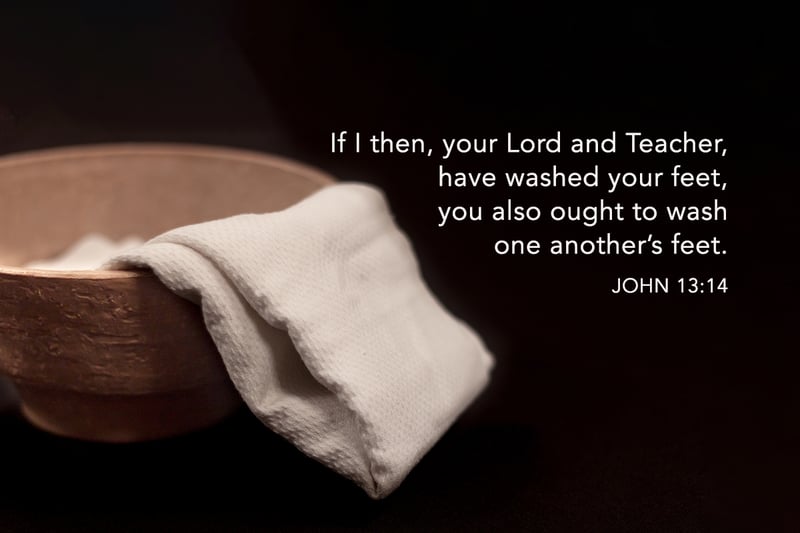What Is the Meaning of John 13:14—“Wash One Another’s Feet”?
Why did Jesus wash the disciples’ feet during the Passover? And why did He tell His disciples to follow His example? What does foot washing teach us?

During the final Passover of His human life, Jesus Christ introduced three new symbols to an ancient and incredibly important evening. Those three symbols were unleavened bread, wine and foot washing.
Now, nearly a millennium and a half later, the Son of God was showing His disciples that the Passover was about something bigger.
Much bigger.
The required sacrifice at the Passover was a lamb “without blemish, a male of the first year” (Exodus 12:5). Through the symbols of bread and wine—both of which were an existing part of the Passover meal—Jesus revealed that He was the ultimate Passover lamb.
He was about to become the perfect sacrifice, offering up His body and His blood to pay the penalty for sin and free God’s people from its clutches (Matthew 26:26-28; John 8:34-36; 1 Corinthians 5:7).
(To learn more about the Passover, read “What Is the Passover, and Why Is It Important?”)
Foot washing as a symbol

Jesus “rose from supper and laid aside His garments, took a towel and girded Himself. After that, He poured water into a basin and began to wash the disciples’ feet, and to wipe them with the towel with which He was girded” (John 13:4-5).
Foot washing was the act of a servant. In fact, in some ways, it was even beneath a servant. Many of the Old Testament examples of foot washing show people washing their own feet (Genesis 18:4; 24:32; 43:24).
Peter, who had already come to acknowledge Jesus as “the Christ, the Son of the living God” (Matthew 16:16), was intensely uncomfortable with what Jesus was doing. The other disciples probably felt the same. Peter tried to refuse, but Jesus answered, “If I do not wash you, you have no part with Me” (John 13:8).
This was important.
This is important.
After washing all 12 pairs of feet, Jesus asked His disciples, “Do you know what I have done to you? You call Me Teacher and Lord, and you say well, for so I am. If I then, your Lord and Teacher, have washed your feet, you also ought to wash one another’s feet. For I have given you an example, that you should do as I have done to you” (verses 12-15, emphasis added).
Christ expected continual foot washing
In English, when you tell people to wash something, you probably expect them to wash it once and be done. But when John wrote his Gospel account, he used a Greek tense that implies repeated action. Jesus wasn’t telling the disciples to wash each other’s feet once, but repeatedly.
There are two big lessons here:
1. Foot washing is an annual reminder.
Jesus expected the disciples to continue observing the yearly Passover. He intended these new symbols—the bread, the wine and the foot washing—to remind His disciples of the spiritual significance of the Passover ceremony year after year. He was about to become the Passover Lamb, and He left His disciples instructions to eat the bread and drink the wine in remembrance of Him (1 Corinthians 11:24-25) and to “wash one another’s feet.”
Today, some 2,000 years later, baptized Christians around the world still come together once a year to do exactly that—to commemorate the death of Jesus Christ by eating the bread that symbolizes His body, drinking the wine that symbolizes His blood, and washing each other’s feet as a symbol of Christ’s attitude of humble service.
2. Foot washing represents an ongoing attitude of humility.
Even though the actual foot washing happens only once a year, the foot-washing mindset—a mindset of humility and service—ought to be a continual, year-round habit.
Jesus, the One who taught us to make foot washing an annual practice, also gave us an example of a life lived in service to others. His instruction—“For I have given you an example, that you should do as I have done to you” (John 13:15)—is about more than an annual ceremony. It’s about a way of life.
Foot washing was the act of a servant. In fact, in some ways, it was even beneath a servant.
Paul urged the Philippians to “complete my joy by being of the same mind, having the same love, being in full accord and of one mind. Do nothing from selfish ambition or conceit, but in humility count others more significant than yourselves. Let each of you look not only to his own interests, but also to the interests of others” (Philippians 2:2-4, English Standard Version).
When we look at others as being more significant than ourselves—when we actively look for ways to serve their interests instead of only our own—we begin to develop the mindset of humility and service “which was also in Christ Jesus” (verse 5).
Jesus also told His disciples, “Whoever desires to become great among you, let him be your servant. And whoever desires to be first among you, let him be your slave—just as the Son of Man did not come to be served, but to serve, and to give His life a ransom for many” (Matthew 20:26-28).
As the Son of God, Jesus had every right to come to earth demanding—and deserving—the service of others.
But that’s not what He did.
He served. And He told us to serve too.
In the eyes of God, greatness is service. More than a once-a-year act, the foot-washing mindset ought to prompt us to look for opportunities to serve our brothers and sisters in Christ. And like foot washing, that service should be a repeated, habitual action—not a one-time event.
To learn ways we can serve, read “Serving God: Eyes, Ears and Mouth” and “Serving God: Hands and Feet.”
Tips for maintaining a foot-washing mindset
The foot-washing mindset doesn’t come naturally to most of us.
Serving others takes humility and effort. Our human nature naturally leads us to put our needs first, before the needs of others.
That’s why being mindful of the needs of others takes effort.
Here are some steps we can each take to build and maintain the foot-washing mindset Jesus wants from His disciples:
1. Treat each other as connected
Paul explained to the Corinthian believers that “there are many members, yet one body” (1 Corinthians 12:20). When we become part of God’s Church, we join a spiritual body in which every Christian is connected. It’s a two-way street: what affects our neighbors affects us; what affects us affects our neighbors.
As Paul put it, “If one member suffers, all the members suffer with it; or if one member is honored, all the members rejoice with it” (verse 26).
When we serve others, we help the whole body—and that includes ourselves. A single act of service can overflow into the lives of countless others as we continue to “grow up in every way into him who is the head, into Christ, from whom the whole body, joined and held together by every joint with which it is equipped, when each part is working properly, makes the body grow so that it builds itself up in love” (Ephesians 4:15-16, ESV).
The foot-washing mindset should lead us to serve others simply because we want to do good—but it helps to remember that the good we’re doing benefits the entire Body of Christ.
2. Plant now what you’d like to harvest later
Serving others is a lot like planting a seed. Sometimes, we can find ourselves serving and wondering if we’re really accomplishing anything useful. A farmer, likewise, “waits for the precious fruit of the earth, waiting patiently for it until it receives the early and latter rain” (James 5:7).
The foot-washing mindset should lead us to serve others now, knowing that we are planting seeds of kindness, compassion and generosity that will yield a harvest in the future.
In both cases, the harvest is coming—and “he who sows sparingly will also reap sparingly, and he who sows bountifully will also reap bountifully” (2 Corinthians 9:6).
We might not see the results of our service for months, years or even decades—but that doesn’t mean the seeds aren’t worth planting:
“Do not be deceived, God is not mocked; for whatever a man sows, that he will also reap . . . And let us not grow weary while doing good, for in due season we shall reap if we do not lose heart. Therefore, as we have opportunity, let us do good to all, especially to those who are of the household of faith” (Galatians 6:7, 9-10).
The foot-washing mindset should lead us to serve others now, knowing that we are planting seeds of kindness, compassion and generosity that will yield a harvest in the future—in our lives and in the lives of others.
3. Following Jesus is more than an intellectual pursuit
An important part of being a Christian is studying the Bible—the Word of God. But an even more important part is doing the Word of God. James reminded the Church that we must “be doers of the word, and not hearers only” (James 1:22).
We can’t be Christians if our studying never translates into action.
Jesus gave a chilling warning about the judgment He would pass on Christians who failed to serve: “Depart from Me, you cursed, into the everlasting fire prepared for the devil and his angels: for I was hungry and you gave Me no food; I was thirsty and you gave Me no drink; I was a stranger and you did not take Me in, naked and you did not clothe Me, sick and in prison and you did not visit Me” (Matthew 25:41-43).
He clarified that when we fail to serve “the least of these My brethren” (verse 40, compare verse 45), we fail to serve Him.
The foot-washing mindset keeps us focused on the fact that when we serve our brothers and sisters in the Church, we’re actually serving Jesus Christ—and when we neglect them, we’re actually neglecting Jesus Christ.
“You also ought to wash one another’s feet”
The command to wash each other’s feet carries huge implications for all Christians. The fact that we are to continue washing each other’s feet ties into the fact that God expects all baptized Christians to be attending the annual Passover service, sharing the important symbols of the blood and body of Jesus Christ.
But it also ties into the fact that we must be developing a foot-washing mindset—a continual focus on serving others the way Jesus served us, giving of our time and energy to help when and where we can. The more we learn to do this, the better we will fulfill our Teacher’s instruction: “Do as I have done to you.”
Date Posted: February 20, 2024



